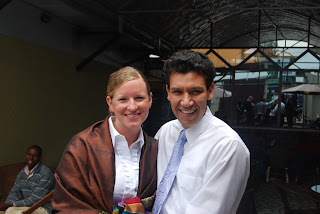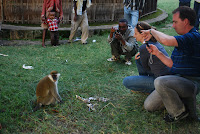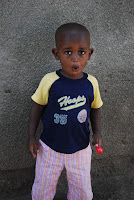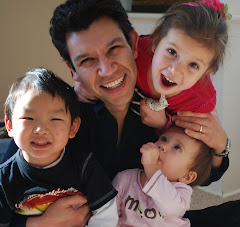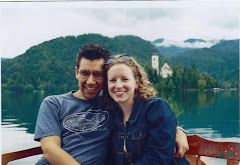We came down for breakfast and this time ordered "quinche." This dish is oatmeal cooked like rice (so it is served with no liquid) and a LOT of butter. It was good, but really, a lot of butter. Last night for the first time I got a little sick after eating some fish at the restaurant... so 8 days off the beaten track eating goat that was unrefrigerated and coffee made with well water, and now I eat in the fancy restaurant at the hotel and pick up a bug! Incredible that I wasn't sick sooner:). It's all part of the fun, so no complaints. Ato Girma came over and told us (quite surprised) that the other WACAP families are coming in this afternoon, and so we could all go to the orphanage once they get in. Actually the conversation was more like this: "You are never going to believe this coincidence! There are families coming from WACAP! They hired a car! Maybe you can go back with them to Addis when they leave!? Didn't this all work out perfectly!?" We didn't explain that we knew they were coming, made a hotel reservation for them, and tried to tell him. It all didn't matter:).
*
Tonio and I decided to take a walk around Awassa. We walked from the hotel, to the main roundabout, past the cathedral. We passed a lot of men walking hand in hand (common in ET), women and children carrying firewood, children cleaning shoes or selling fruit. Once passed the cathedral, we passed some smaller markets, people selling socks and shoes on the street. We found a store with traditional Sidamo clothes and handmade items, but it was closed! We definitely want to come back when it is open. We walked down the main street toward the lake and found the Awassa University. It seems to be that there are different colleges located around Awassa that form the University- we passed a huge campus that was the Forestry College, and this campus has a lot of agriculture buildings, and some health sciences, and teacher education. It was a walled/gated campus and we showed Tonio's license to get in and walk around. It seemed like the entire campus was under construction. We saw dorms (guessing they were dorms when we saw bunk beds in the windows), a large room of pool tables (maybe the student union?), many different buildings of classrooms: nutrition, harvest processing, food science, etc. There was a library, and lots of students hanging around (mostly male). They had a nice football (soccer) field with a track around it, and some students were exercising. It was a nice campus!
*
After walking around, we headed to Lake Awassa. You might have seen Awassa spelled Hawassa- Girma told us that the government is trying to make uniform spelling rules of name places that use both traditional. local language spelling and then Amharic spelling. Apparently they officially changed the spelling to Hawassa, although in the town people kept saying it without the H, and we saw it spelled more without the H (although on gov't building it was spelled the official way). So Lake Awassa (or maybe they will change it now to Lake Hawassa) was formed during a volcanic eruption and is one of the smaller lakes in the Rift Valley. There is a huge variety of bird life, and I wish we had an orinthologist with us to tell us about all of the unique birds we saw: bright royal blue, yellow, brilliant green, some diving birds, large marabous and other storks, brown and black birds that were fishing... We walked along a path by the shores of the lake, sharing the views with a lot of families and couples. We bought some popcorn (which incidentally is Tonio's favorite snack), and passed some little cafes with billiards open to the lake breezes. After walking a while we somehow arrived back at the hotel. The perfect walk! We met Ato Girma again, and he told us that the families would be arriving around 2pm, so we relaxed in our room and checked the painfully slow email. Waiting for the other WACAP, we relaxed in the reception and Tonio enjoyed a St. George beer while I had my avocado/mango juice. Ato Girm told us more about the Sidama people, describing them as peaceful, respectful, and known for their warm hospitality. He told us that the average Sidama family had at least 7 children, and that the average age to marry is around 12 years old. He clarified and said "12, 13, 14, 15 years old... 16 is too old." He told us how the generations are so close in age that frequently great-grandparents, grandparents, parents, and children all share the same land (and repeated the story from yesterday that there is not enough land in the region to support the growing families.
*
We were getting regular updates from the driver on his cell phone, and soon the families were only minutes away. Girma told us how normally the driver was quite slow and cautious, and it normally takes him longer to drive from Addis to Awassa (haha, you will see on our trip home that this is not always the case!). It was so exciting to meet the other families- in adoption you share such an intimate experience with the other parents... we were fortunate both in China and here to share this colossal event with wonderful people, with whom we will keep in contact forever. In the first picture, you can see Vonne and Tom, parents of 4 who are adopting a sibling group of 2 beautiful sisters. Next is Emmanuel and Matthew, adopting their first child, a gorgeous baby girl. In the picture you can also see Askala, the home manager who has been so kind to Engida.





Today Engida was still terrified of us. He was understandably suspicious at our motives, and looked to his nanny and Askala for comfort. When he does not have them in view, he looks down and his bottom lips trembles as he tries not to cry. I imagine Maya in this terrible situation, and I know she would feel the same fear (although it would manifest in an enormous tantrum). I feel so bad that we are the cause of his suffering. I know that when we get home and get past the grieving process, he will become more comfortable and soon be a different child. But until then, our poor little guy is unhappy with this whole situation! Imagine your young child is nudged into a room with strange-looking people: "Give them a kiss- this is your mommy!" So confusing, so abstract a notion, so unnatural. Not to be such a downer, I'm just trying to understand the situation from his point of view and put myself in his shoes... When adoptive parents can understand the fear, I think it is easier to deal with the rejection and work to build a connection.


This day Engida really wanted nothing to do with me, but did let Tonio get a little closer. We played with his little friend to try and break the ice a bit. Vonne brought these great magnetic shapes that the kids used to build little structures. We decided that Engida's little was going to be a civil engineer after seeing the intensity of his concentration and his elaborate creations.

It helped Engida when he didn't have to look directly at us, but could listen to our voices as we "parallel played" with him and his friend.

When I went on another tour of the facility with the other families, Tonio stayed behind and fed popcorn to each of the children. It was an introduction to the many bonding activities we will try with Engida, and Tonio said he even made eye contact as he put the popcorn in Engida's mouth.



I could have sat there all day watching Engida, but we agreed that we didn't want to make this more stressful than necessary, and that the kids should keep on their normal schedule. So after playing with the kids for a couple of hours, Girma took us to a park by the lakeshore. Tonio and Emmanuel both fed a monkey out of their hands (while I prayed irrationally that the monkey wouldn't jump up and bite Tonio and give him rabies). We saw a wedding with lots of vibrant music and tons of teenagers loitering around, enjoying the environment. Tonio had the video camera out and was sweeping the scene when a bunch of teenagers saw the camera and started posing and being funny. We walked along the shore and then headed back to the hotel.


